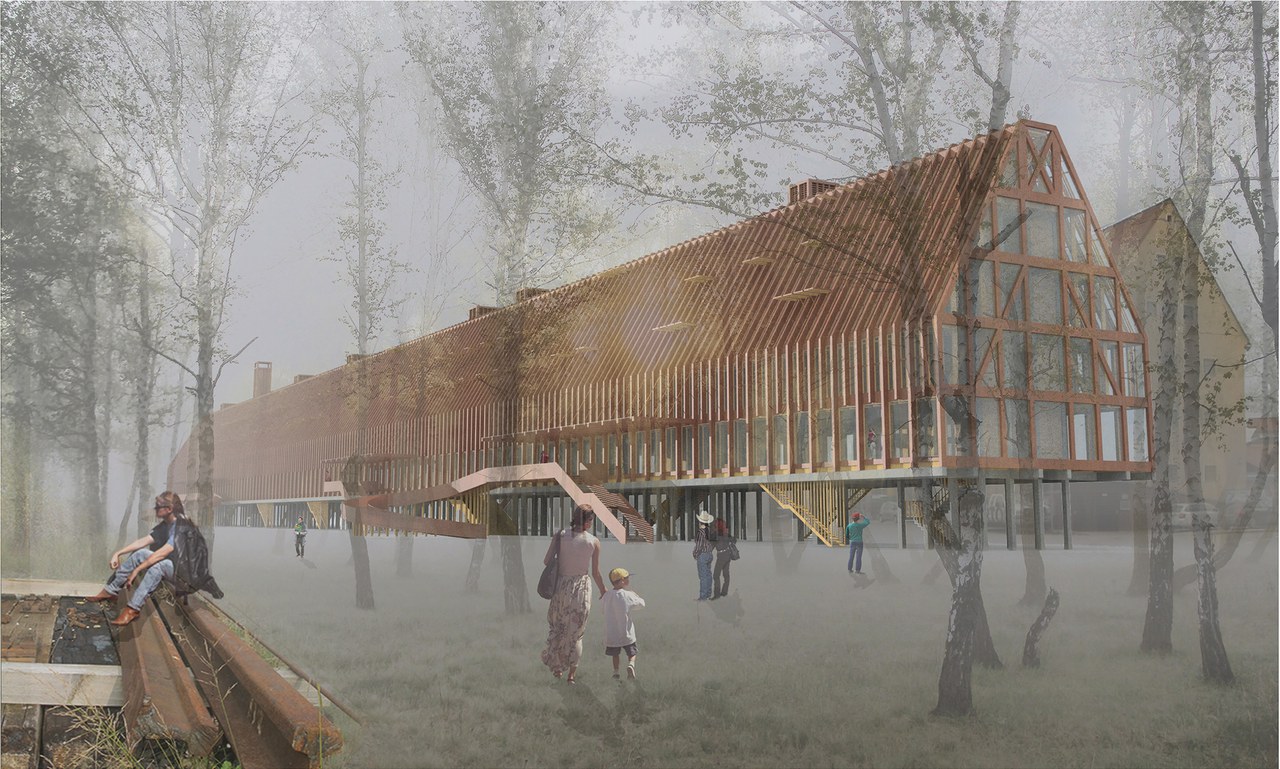The Institute of Architecture and Planning of the University of Liechtenstein is proving to be a real crucible of achievement. First this year there was Dinah Brütsch, who received the SIA Recognition Prize of the Swiss Society of Engineers and Architects; then Martyna Michalik and Hana Plescakova both won a Global Schindler Award; and now Laurentiu Tiberiu Stancu has received first prize for the Best Diploma Project under the auspices of the European Architectural Medals.
European Architectural Medals for the Best Diploma Projects is an annual European competition which awards prizes for outstanding performance in the transitional phase from the study of architecture to professional practice. The organisers of the prize are the European Association for Architectural Education (EAAE), a non-profit organisation dedicated to architectural dialogue within Europe, the Architects’ Council of Europe (ACE), which represents the interests of more than 565,000 architects throughout the European continent, and the Ion Mincu University of Architecture and Urbanism (IMUAU) in Romania . The competition is designed to encourage debate on the training of architects, promote awareness of the future challenges with which architecture is faced and to improve quality standards in European and international architectural colleges.
International competition
This year 84 projects were submitted by students from 22 different countries for the European Architectural Medals. After an initial scrutiny by the jury – which included the architects Luciano Lazzari (President of ACE and president of the jury), Professor Karl Otto Ellefsen (President of EAAE and a professor at the Oslo School of Architecture and Design), Professor Zeno Bogdanescu (Rector of IMUAU), Wolf D. Prix of Coop Himmeb(l)au and Leo van Broeck of Bogdan&Van Broeck – a short list of 30 projects emerged. Along with innovation and originality, marks were awarded for a responsible and sustainable approach to social and environmental resources. Twelve projects made it into the next round. Lengthy discussion ensuing resulted in the selection of six finalists. The entire selection procedure was anonymous – that is to say, the members of the jury were unaware of the identity of the authors submitting.
First prize for Laurentiu Stancu
By the unanimous decision of the jury, Laurentiu Stancu’s project ‘Alp Ark 041’ was awarded the first prize. The jury’s verdict: ‘This project contains all the qualities which are crucial for the competition. Starting from a detailed historical and typological analysis, it achieves a building design which is rooted in tradition – not resorting to superficial imitation, however, but reinterpreting traditional elements in new and innovative ways. In masterly style, this project develops the design and technology of timber building in a highly convincing fashion. It engages with municipally planning issues and takes the situation into account, creating a protective wall between the building and the railway tracks. It investigates ecological and energy-saving options, and its functional versatility is an innovative aspect, in that it leaves the ground floor open to the neighbourhood with a view to outdoor activities. The jury is convinced that this is a truly accomplished project.’
Exemplary support for a major talent
Laurentiu Tiberiu Stancu was born in Craiova, Romania, and completed his architectural studies at the Ion Mincu University of Architecture and Urbanism in Bucharest. Following this he worked for two architectural offices in Romania, while running his own studio in parallel. In the winter semester of 2012 Laurentiu embarked on an MSc degree study course in Liechtenstein, occupying the studio of visiting professor Conradin Clavuot, who holds an architectural diploma from the Swiss Federal Institute of Technology, and his assistant Robert Mair D.Eng.
Laurentiu Tiberiu Stancu’s semester projects – an extension of the refugee accommodation facilities in Schluein, Switzerland, and a strategy for future development of the village of Planken, Liechtenstein – had already increasingly shown that he is highly capable of coupling the most varied and complex tasks with his own personal interests, resulting in a versatile and virtuoso treatment. After a semester spent abroad at the KU Leuven Faculty of Architecture in Belgium, he developed his diploma project ‘alphouse Traunstein’ at the University of Liechtenstein under the guidance of Conradin Clavuot and Robert Mair. The first phase of this was concerned with the strategic planning of an extensive waste land in the vicinity of the railway in Traunstein, Germany, at the foot of the Chiemgau Alps. This was to lead on to buildings, interior facilities, options of use, environmental planning and the impression of a house at the transition point between municipally international and functionally related alpine architecture. The studio situation, in which the professor and his assistant work as a team with just 18 students, spending one and a half days weekly on their designs, gives rise to a dynamic atmosphere which is fertile ground for outstanding achievements. Laurentiu’s inexhaustible sketching and thinking in terms of variants was exceptional, though it went along with several extremely exciting and outstanding projects that were carried out this semester.
The need for consideration of so many different issues, together with the size of the waste land plot, lent inspiration to Laurentiu; and the final outcome was a grandiose project which combined experiment, theory, innovation, local culture and the human scale, in a planning conception that extended down to the smallest structural detail. A highlight of the presentation of the thesis at the university was the transformation of the architect’s plans into music. Laurentiu found musical expression for the building structures, and a fellow student performed the resulting composition on the piano.
Laurentiu’s winning the highly coveted European Architectural Award shows that the University of Liechtenstein can inspire talented students, and that the interlocking experimental creativity that engages the precisely planned details of an elaborate project forms an excellent basis for carrying – as has now been demonstrated – the developed skills of an accomplished Liechtenstein graduate to the world.

